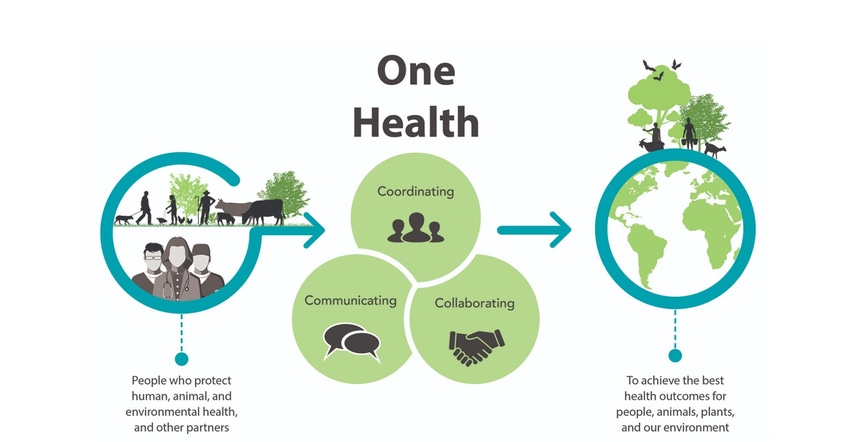Funding boosted for early detection of zoonotic diseases
APHIS receives $300M for emerging virus surveillance as part of One Health focus between human and animal diseases.

In an effort to build an early warning system to alert public health partners to potential threats so they can take steps sooner to prevent or limit the next global pandemic, the USDA is dedicating $300 million in American Rescue Plan funds to conduct surveillance for SARS-CoV-2 and other emerging and zoonotic diseases in susceptible animals.
Over the past two decades, USDA says we’ve experienced devastating outbreaks caused by emerging infectious diseases that are zoonotic, impacting the health of both humans and animals, including West Nile Virus, H1N1 influenza and Ebola virus. In each of these, we remained largely unaware of the potential threat until we started seeing illnesses – and deaths – in humans.
USDA’s Animal and Plant Health Inspection Service is the lead agency responsible for implementing the early warning system and is inviting public comment on Strategic Framework that outlines how the agency will focus its efforts to prevent, detect, investigate and respond to SARS-CoV-2, the virus that causes COVID-19, as well as other emerging and zoonotic diseases that could pose a threat to both people and animals.
“Up to 75% of emerging infectious diseases in humans can also impact the health of animals—we’ve seen this link firsthand with COVID-19,” says Agriculture Secretary Tom Vilsack. “Thanks to the American Rescue Plan, we have a unique opportunity to improve our understanding of disease susceptibility and transmission and build a comprehensive, data-driven system that promotes collaboration among the many experts working to protect the health of livestock, wildlife, people and pets. These meaningful changes will pay long-term dividends for the entire One Health community, as we all work together to achieve the best outcomes for people, animals and plants in a shared environment.”
In December 2017, USDA partnered with the Center for Disease Control and the U.S. Department of the Interior to organize a One Health Zoonotic Disease Prioritization Workshop to identify the zoonotic diseases of greatest national concern that should be jointly addressed. Notably, emerging coronaviruses, which includes SARS-CoV-2, were fifth on the list. Sometime during 2019, SARS-CoV-2 became the next emerging zoonotic disease that was detected only after it was well established in humans. The framework notes public health authorities were left with extremely limited and largely ineffective options for controlling spread and preventing the COVID-19 pandemic.
APHIS’ Strategic Framework uses the One Health approach, which embraces the idea that complex problems that affect the health of humans, animals and the environment are best solved through improved communication, cooperation and collaboration across disciplines and sectors. APHIS’ immediate focus will be on expanding surveillance for SARS-CoV-2 to a wider range of animal species (including domestic species and wild animals), increasing diagnostic testing capability and capacity and conducting multisectoral investigations of new animal detections and exposures.
Establishing an early warning system that will help protect both people and animals from future disease threats will require a multi-year effort. USDA will build upon its existing infrastructure to implement a risk-based, comprehensive, integrated disease monitoring and surveillance system domestically, and enhance collaborations with national, regional and global partners to build additional capacity for zoonotic disease surveillance and prevention using a One Health approach. This holistic approach will benefit all of animal agriculture and the wildlife community by expanding our ability to collect surveillance data and increase our diagnostic and epidemiologic capacity, which will better enable us to rapidly detect and respond to new disease threats and provide early warning intelligence to our public health partners.
The framework builds on APHIS’ proven expertise responding to and eradicating foreign animal disease outbreaks, such as the large-scale U.S. outbreak of highly pathogenic avian influenza in 2015. By leveraging that expertise and strengthening partnerships with the Centers for Disease Control and Prevention and others in the One Health community, APHIS can expand the federal government’s readiness and ability to respond to emerging and zoonotic diseases as needed.
This investment under the American Rescue Plan will ultimately help prevent and minimize the negative impacts of COVID-19 and other emerging and zoonotic diseases on animal health, the economy, public health and food security, the agency says.
The American Veterinary Medical Association has been supportive of the One Health approach and the additional funds provided in the $1.9 trillion American Rescue Plan earlier this year. "We are pleased that the USDA is moving forward with a One Health approach to surveillance for SARS-CoV-2 and other emerging zoonotic diseases," AVMA President Dr. José Arce, says. "The AVMA fully supported the $300 million for monitoring and surveillance in the American Rescue Plan and looks forward to providing input on the Strategic Plan that the USDA announced today."
The 45-day public comment period opens Aug. 24 and closes on Oct. 8, 2021. Interested stakeholders can submit written comments via Regulations.gov. Comments will be reviewed in accordance with Agency posting guidelines and will be viewable on Regulations.gov. APHIS will review all written comments, incorporate feedback as appropriate and share the final framework, which will serve as the agency's roadmap for implementation.
About the Author(s)
You May Also Like



.png?width=300&auto=webp&quality=80&disable=upscale)

